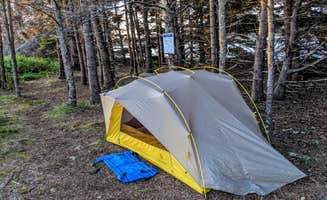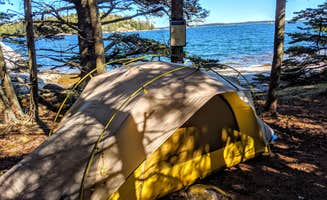Dispersed camping near Alna, Maine includes island camping options through the Maine Island Trail Association (MITA) requiring proper boating experience and self-sufficiency. The Gulf of Maine's unpredictable weather patterns can create challenging conditions for campers, with temperature fluctuations ranging from warm days to cool evenings even in summer months. The region's coastal forests and rocky shorelines provide natural settings for rustic camping experiences without established facilities.
What to do
Sunset watching from camp: Buckle Island's shore site offers unobstructed views over the water. "We stayed at the site by the shore and had a gorgeous view of the sun setting," notes one camper at Buckle Island.
Sea kayaking to multiple islands: Plan multi-day paddling routes connecting different camping locations. Wheat Island serves as an ideal starting point for exploring nearby destinations. "Perfect island for exploring the close-by Isle au Haut, a remote section of Acadia National Park," reports a visitor who used the island as a base camp.
Wildlife observation: The coastal ecosystem supports diverse bird species and marine life. Bring binoculars for spotting seabirds, seals, and occasional porpoises from your campsite. Morning and evening hours typically offer the best wildlife viewing opportunities.
What campers like
Easy landing access: Some islands provide better landing conditions for less experienced paddlers. "This is a perfect island for those new to sea kayak camping as the sandy shore, which is exposed for a good portion of the day, is easy to land on and a short walk to a trail into the woods," explains a reviewer about Wheat Island.
Site variety: Islands offer different camping environments within a small area. "One larger area up in the woods, the other quite small near the granite shore, but both accessible from the east side of the island," describes a visitor regarding site options on Buckle Island.
Solitude: The remote nature of these sites ensures minimal crowds and quiet camping experiences. The limited accessibility means campers often have entire islands to themselves, particularly on weekdays or during shoulder seasons.
What you should know
Tidal planning: Water levels significantly affect landing conditions. A camper advises, "This can be a tricky island to land on at high tide, so plan accordingly," regarding conditions at Wheat Island.
Complete self-sufficiency required: No services or amenities exist on these islands. "Come prepared with fresh water (there is no fresh water for filtering) and wag bags (no toilets)," recommends an experienced Buckle Island visitor.
Membership requirement: Access to these primitive camping locations requires Maine Island Trail Association membership. Sites operate on "first come, first served and completely free for MITA members," according to multiple camper reports.
Tips for camping with families
Choose larger group sites: Some camping areas accommodate family groups better than others. On Wheat Island, a camper notes there are two distinct options: "one very small one on the northeast side, the other perfect for larger groups on the southwest side."
Insect preparation: Bring appropriate repellent regardless of season. "Be prepared for mosquitoes. We thought we were passed mosquito season in early September, but alas, they were pretty bad at sunset," warns one Buckle Island camper.
Weather contingency plans: The Gulf of Maine experiences frequent fog, wind shifts, and sudden temperature changes. Pack additional warm layers and waterproof gear even for summer trips, and include extra food in case weather delays departure.
Tips from RVers
No vehicle access: Rustic camping near Alna, Maine primarily consists of boat-in island sites without RV accommodations. Vehicle-based campers seeking dispersed camping must consider mainland alternatives farther inland.
Equipment transport limitations: When planning boat-in camping from RV base camps, consider weight and volume constraints of kayaks or small boats. Essential gear must be compact and lightweight for effective transport to island camping locations.
Parking considerations: Public boat launches near access points may have overnight parking restrictions or fees. Research specific regulations at your intended launch site before leaving vehicles unattended during multi-day island camping trips.



